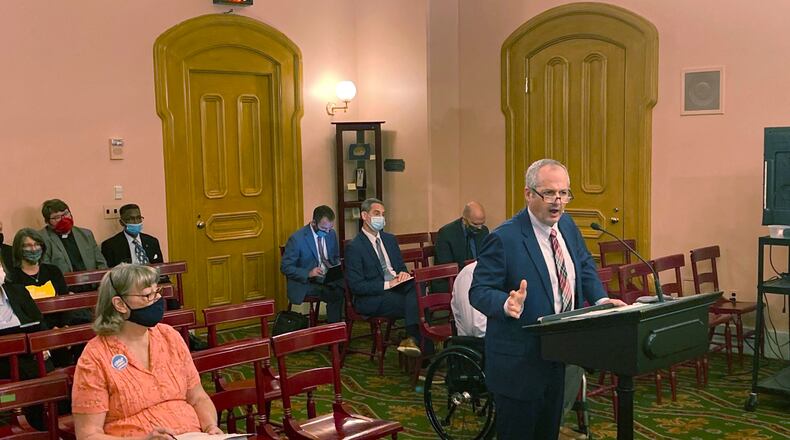The House bill’s text is identical to Senate Bill 103, sponsored by Huffman and state Sen. Nickie Antonio, D-Lakewood.
“It’s a companion bill,” Huffman said. “I’m very encouraged that the House is starting to talk about it. I’m hoping we can get some momentum to get this done in this General Assembly.”
Both bipartisan bills were filed last March, but SB 103 has had only two hearings in the Senate Judiciary Committee — most recently in June.
Recently, though, Huffman has been talking with Senate Judiciary Chair Nathan Manning, R-North Ridgeville, hoping to get his bill moving, too.
The House committee heard invited testimony Thursday from two supporters of the bill: attorney Christopher Finney of Cincinnati and Laura Streitmann, executive director of Cincinnati Right to Life.
“The reality is that the death penalty is not achieving its objective, which is to reduce crime, to reduce murders,” Finney said. That’s shown by the lack of difference in murder rates between states that do or don’t have the death penalty, he said.
Finney said he opposes the death penalty as demeaning to human life, but that his focus is on its “extraordinary expense.”
The legal requirements for death penalty cases make them many times more expensive than imposing a sentence of life in prison, he said.
Finney is a co-founder of Cincinnati-based Coalition Opposed to Additional Spending & Taxes, but that organization has not taken a position on the death penalty, he said.
Finney also cited the potential for innocent people to be executed. In Ohio, 11 “innocent people (have been) freed from death row,” according to the Death Penalty Information Center, a national nonprofit information group.
Streitmann said she has testified against abortion several times before Ohio legislators, but came Thursday to defend the sanctity of life in general, including those convicted of murder.
She told the story of her uncle’s murder by two teenagers in Louisville, Ky., in 1977. Neither one was sentenced to death, but Streitmann’s family never sought that, she said.
She asked that the death penalty be replaced by sentences of life without parole, hoping that some of those convicted would have time for religious conversion before their natural deaths.
Both the House and Senate bills would abolish the death penalty in Ohio, replacing it with sentences of life imprisonment with a chance of parole after 20 years, 30 years, or never; with the worst crimes required to draw at least 30 years or life without parole.
The bills would not be retroactive, according to analysis by the Ohio Legislative Service Commission; so if passed, the abolition would not affect the 135 inmates now on Ohio’s Death Row. They would also allow inmates whose death sentences have been overturned and are due to be resentenced to still receive the death penalty.
Ohio has not conducted any executions since 2018, according to the Death Penalty Information Center. Last month Gov. Mike DeWine reprieved three inmates who were scheduled for execution this year, citing “ongoing problems involving the willingness of pharmaceutical suppliers to provide drugs to the Ohio Department of Rehabilitation and Correction.” Their executions are now slated for 2025.
About the Author

